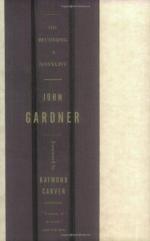
|
| Name: _________________________ | Period: ___________________ |
This test consists of 5 short answer questions, 10 short essay questions, and 1 (of 3) essay topics.
Short Answer Questions
1. Which philosopher maintained that nothing a writer writes means anything, "all the words are a lunatic blithering," since all language is by nature false and misleading?
2. Who wrote Bartelby the Scrivener?
3. Which author wrote A Tale of Two Cities?
4. Gardner notes in Chapter 1 that all writing requires some measure of a ____ state.
5. What does Gardner say "breeds success" in Chapter 1?
Short Essay Questions
1. In Chapter 1, what does Gardner say the most common question of the aspiring writer is to him? What is the response?
2. What does Gardner suggest as ways to understand the psychology of characters unlike themselves?
3. Who does Gardner refer to as the "best" novelists in Chapter 1? What lesson does he cite of them?
4. What does Gardner remark of the author's sense of observation in Chapter 1?
5. Where did Gardner learn his method of writing?
6. What does Gardner relate about the "author's character" in Chapter 1? How does he describe "special intelligence?"
7. What is the "moronic setup" that Gardner relates in Chapter 1?
8. What does Gardner write about showy language in Chapter 1?
9. What state does good fiction elicit in the reader, according to Gardner?
10. What hypothetical situation does Gardner uses as an example of plot in Chapter 1?
Essay Topics
Write an essay for ONE of the following topics:
Essay Topic 1
Discuss what Gardner refers to as "faith" in the final chapter. Where does the author find faith? How should the author go about escaping writer's block?
Essay Topic 2
Discuss what Gardner refers to as "special intelligence" in the writer. How does Gardner's definition of intelligence differ from the dictionary definition?
Essay Topic 3
Describe the author's keen sense of observation. Why is this necessary? How does it affect the author?
|
This section contains 747 words (approx. 3 pages at 300 words per page) |

|




